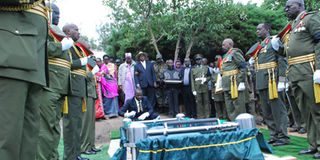Aronda was stopped from visiting hospital

The casket containing the remains of Gen Aronda Nyakairima being lowered into the grave at his ancestral home in Nyakiju village, Rukungiri District, yesterday. PHOTO BY COLLEB MUGUME
What you need to know:
Revelation. Fellow traveller says an official gave the minister tablets to swallow
Kampala.
A senior government official familiar with Internal Affairs minister Aronda Nyakairima’s last days has revealed that a protocol officer stopped the minister from checking into a hospital when he became unwell in South Korea, and instead gave him privately-procured drugs.
Prof Peter Kasenene, the chairman of the National Identification and Registration Authority (NIRA) under Aronda’s docket at the time of his demise, had accompanied the minister to Seoul and shared the same vehicle with the minister during the nearly one-week official trip.
In accounts to mourners at the general’s burial in Rukungiri, his home district in western Uganda, Prof Kasenene, speaking in Runyankore, said when the minister felt unwell, a protocol officer he did not name suggested that Aronda, who had complained of dizziness, was unlikely to receive treatment in South Korea due to lack of travel (medical) insurance.
“I talked to the protocol officer and General (Aronda) and we agreed that we should go to hospital, but the protocol officer told us that ‘if you don’t have insurance here, you are not allowed to get treatment and, therefore, I can’t take you to hospital,” Prof Kasenene said.
He added: “The protocol officer instead brought medicine for Aronda in a sachet with instructions for him to swallow five tablets every six hours.”
President Museveni, who had summoned the board chairman to the rostrum to explain events leading up to the minister’s demise, cut him short and waved him off to make way.
A hostess found Aronda, booked on seat 22G, dead aboard Emirates plane on a September 12 Seoul-to-Dubai return flight.
At the State funeral at Kololo ceremonial grounds, in Kampala, last Friday, President Museveni attributed Aronda’s death to a denial of treatment for him by South Koreans over lack of medical cover. The minister, a former Chief of Defence Forces, had had mild hypertension and two heart attacks before the fatal recurrence, the President said.
“Surely in South Korea they must have emergencies. How can someone come as an emergency and then you say insurance, insurance. You treat him and see if he will not pay,” Mr Museveni said.
“What was the problem?” he asked, saying he had been “annoyed” by Aronda’s death.
According to a postmortem that government pathologists conducted at Mulago National Referral Hospital, and whose report Prime Minister Ruhakana Rugunda read out in Parliament last Thursday, the Internal Affairs minister succumbed to acute cardiac arrest.
The next day, at the State funeral at Kololo, his widow Linda cast doubt on the findings, saying: “This heart problem they are talking about, okay, it might have been there but the 20 years I have lived with my husband I have never seen him sick; my children are witnesses. We have never seen him sick.”
On the day of Aronda’s demise, and before any autopsy, Uganda Media Centre executive director Ofwono Opondo declared that the general had died of cardiac arrest.
Purpose of the trip
The minister and senior officials of the newly-created Citizenship Registration Authority travelled to Seoul on September 8, at the request of a company which also invited representatives of 30 other countries to showcase its equipment and technology for registration. In his entourage were NIRA executive director Judith Obitre-Gama, and the authority’s Information Technology director, Mr Clet Turiyo.
The officials had reportedly scheduled bilateral business with South Korean officials, to learn the best practices in citizens’ registration, which the south Asian country has done since the early 1960s.




